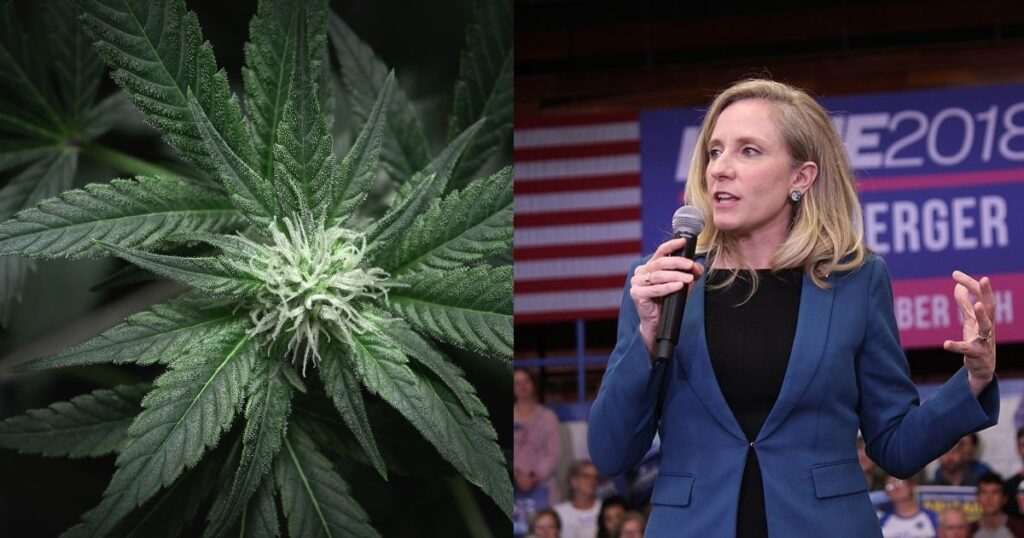The recent election of Democrat Abigail Spanberger as Virginia’s next governor could signal a significant shift for the future of recreational cannabis in the state. Her victory brings renewed optimism for establishing a legal retail market, a move consistently blocked by outgoing Governor Glenn Youngkin. This change in leadership could finally end the state’s unusual legal limbo, where cannabis is legal to possess but not to sell.
For years, Virginia has been in a strange position. Since 2021, adults have been legally allowed to possess, cultivate, and gift small amounts of cannabis. However, the path to a regulated, taxable retail market has been obstructed. Governor Youngkin twice vetoed legislation that would have created this framework, citing public health and safety concerns.
This has left Virginia as the only state with legal possession but no legal sales, fostering a booming illicit market estimated at $3 billion annually. With Spanberger’s election, advocates and consumers are hopeful that Virginia will finally join the ranks of states with a fully functional, regulated cannabis industry. This article will explore the new governor’s stance, the potential path forward for legislation, and what this means for Virginians.
A Change in Leadership, A Change in Policy
Governor-elect Abigail Spanberger’s win is a game-changer for cannabis policy in Virginia. Unlike her predecessor, Spanberger has openly supported the creation of a regulated market for adult-use cannabis sales. Her position marks a clear departure from the prohibitionist rhetoric that has stalled progress for the past two years.
Spanberger’s Pro-Legalization Stance
Throughout her campaign, Spanberger made her intentions clear. She emphasized the need for a well-structured system that prioritizes safety, fairness, and economic growth. In a statement to Marijuana Moment before the election, she stated, “as Virginia takes steps toward creating a legalized retail market for cannabis, the commonwealth needs a clear strategy to set up a market that is safe for consumers, transparent for businesses, and fair to entrepreneurs.”
Spanberger has also highlighted how the revenue from this new market could benefit the state. She believes that “revenue from commercial cannabis products must return to Virginia communities and be reinvested for purposes like strengthening our public schools.” This approach frames legalization not just as a matter of personal freedom, but as a strategic economic and social policy.
Her support isn’t new. During her time in Congress, Spanberger consistently voted in favor of federal cannabis reform, including bills to legalize marijuana and protect banking services for the industry.
The Contrast with Governor Youngkin
The previous administration under Governor Glenn Youngkin represented a significant roadblock. Despite bipartisan support in the legislature for establishing a retail market, Youngkin vetoed bills in both 2023 and 2024, he argued that legalization would endanger public health and safety, claiming it would lead to increased crime and mental health issues.
These claims, however, are at odds with the 63% of Virginians who support legal and regulated cannabis sales, according to a 2024 Roanoke College poll. Youngkin’s vetoes effectively maintained the status quo, allowing a massive, unregulated illicit market to thrive without any of the consumer protections or tax revenue that a legal framework would provide.
The Path Forward for Virginia Recreational Cannabis Legislation
With a pro-legalization governor and a Democratic majority in both the House and Senate, the path for passing cannabis sales legislation looks clearer than ever. Lawmakers and advocacy groups are already preparing to introduce new proposals in the upcoming legislative session.
What to Expect in the 2026 Session
The Virginia General Assembly is expected to act quickly. A legislative body, the Joint Commission to Oversee the Transition of the Commonwealth into a Cannabis Retail Market, has already been working on drafting a bill. The plan is to present a comprehensive proposal for the full legislature to consider when the 2026 session begins in January.
This new legislation will likely build on the bills previously vetoed by Governor Youngkin. Key components will probably include:
- Licensing Structure: A system for licensing cultivators, processors, distributors, and retailers.
- Taxation: A tax structure designed to generate revenue for public services while keeping prices competitive with the illicit market.
- Social Equity: Provisions to ensure that communities disproportionately harmed by the war on drugs have a fair opportunity to participate in the new industry.
- Public Safety: Regulations around product testing, packaging, and marketing to protect consumers, especially minors.
JM Pedini, executive director for Virginia NORML, expressed confidence in the new political landscape. “Governor-elect Spanberger’s win finally gives Virginia the long-overdue opportunity to establish a regulated adult-use cannabis market,” he told Marijuana Moment. “Legislators have done the work and the public is ready. Now it’s time to deliver a safe, legal marketplace.”
What a Legal Recreational Cannabis Market Means for Virginia
Establishing a regulated retail market for cannabis in Virginia will have wide-ranging impacts, from generating new tax revenue to enhancing public safety.
Economic and Community Benefits
A legal market will create thousands of jobs and generate hundreds of millions of dollars in annual tax revenue. As Governor-elect Spanberger suggested, the state can reinvest these funds into critical public services like schools, infrastructure, and mental health programs. Furthermore, a regulated system provides a formal structure for businesses to operate, contributing to the state’s overall economic growth.
Public Health and Safety
One of the most compelling arguments for a legal market is public safety. The current unregulated system means consumers have no way of knowing the potency, purity, or safety of the products they purchase. A regulated market introduces mandatory product testing for contaminants like pesticides and heavy metals, along with clear labeling for potency.
During a debate, Spanberger, a former federal agent, emphasized this point. “It is extraordinarily important that we have transparency and that there is a clear market in order to be enforced,” she said. By bringing sales out of the shadows, law enforcement can focus on more serious crimes, and the state can implement effective public health campaigns about responsible consumption.
A New Beginning for Recreational Cannabis in Virginia
The election of Abigail Spanberger as governor marks a pivotal moment for cannabis reform in Virginia. After years of legislative gridlock, the state finally has a clear path toward establishing a safe, regulated, and profitable adult-use cannabis market. This shift not only aligns with the will of the majority of Virginians but also represents a pragmatic approach to public health, safety, and economic development.
The work is far from over. Lawmakers will need to craft careful, comprehensive legislation that addresses the complexities of taxation, social equity, and public safety. However, with a supportive governor and a willing legislature, the question is no longer if Virginia will have legal cannabis sales, but when.
- Virginia Governor Continues To Stand In The Way Of Progress
- Virginia Governor Youngkin Vetos Legal Marijuana Sales Yet Again
- Virginia Governor Continues To Stifle Adult-Use Marijuana Legalization
- Virginia Governor Lets Legislative Session End Without Signing Adult-Use Marijuana Bill
- Virginia Legislators Pass Marijuana Sales Bill, Gov. Youngkin Still Needs to Sign For Approval
















